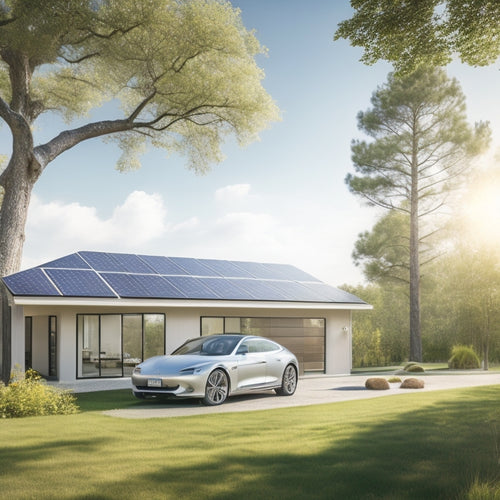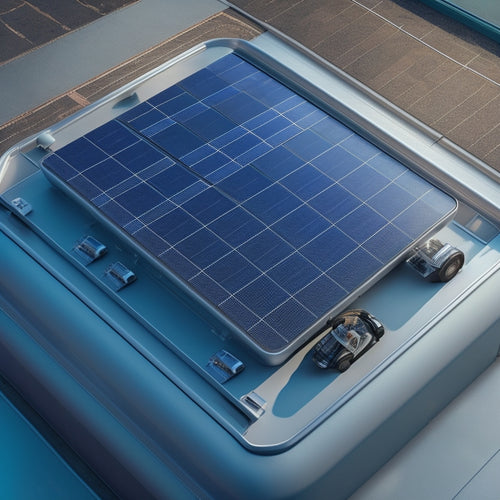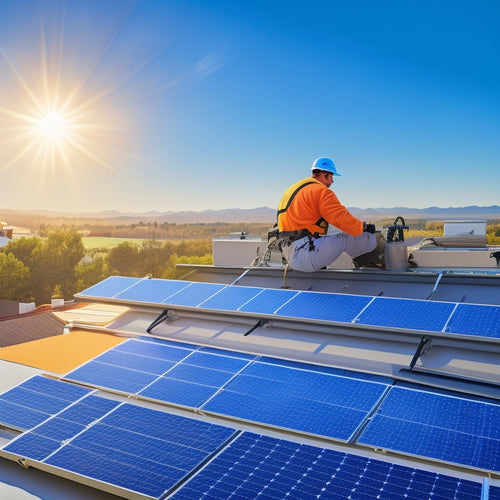
3 Best Commercial Solar Panel Cost Savings Estimates
Share
You can expect to save between $15,000 and $200,000 or more per year on your energy bills by installing a commercial solar panel system. The average cost savings range from $15,000 to $200,000 or more, with a return on investment (ROI) of around 10-15% per year. Factors like system size, electricity rates, and local incentives affect savings. You'll also benefit from reduced energy expenses, increased property value, and protection from rising electricity costs. As you explore commercial solar panel options, you'll discover the specifics of how these estimates can apply to your business, maximizing your cost savings and boosting your bottom line.
Key Takeaways
• Annual cost savings from commercial solar panels range from $15,000 to $200,000 or more, depending on system size and local incentives.
• The Solar Investment Tax Credit (ITC) and Renewable Certificates (RECs) contribute to substantial savings, with potential financial rewards up to $50,000 to $75,000 per year.
• Commercial solar panels can reduce energy expenses by 30-50%, leading to increased profitability and a return on investment (ROI) of around 10-15% per year.
• By locking in low electricity rates for 25 years or more, commercial solar panels provide long-term energy expense reduction and protection from rate hikes.
• State incentives, such as property tax exemptions and sales tax exemptions, further decrease costs and increase the overall savings from commercial solar panels.
Top Commercial Solar Panel Savings
By installing commercial solar panels, you can reap substantial financial rewards, with top savings reaching as high as $50,000 to $75,000 per year for large-scale systems.
One key factor contributing to these substantial savings is the array of solar incentives available to commercial solar panel owners.
For instance, the Solar Investment Tax Credit (ITC) allows you to claim a tax credit of up to 26% of the total system cost.
Additionally, you can benefit from Renewable Certificates (RECs), which are certificates earned for every megawatt-hour of electricity generated from solar power.
These RECs can be sold on the open market, providing an additional revenue stream.
In addition, many states offer their own set of incentives, such as property tax exemptions and sales tax exemptions, which can reduce your costs more dramatically.
By taking advantage of these solar incentives, you can notably decrease your energy expenses and increase your bottom line.
With commercial solar panels, you can enjoy a strong return on investment and a reduced carbon footprint – a win-win for your business and the environment.
Average Cost Savings per Year
Your annual cost savings with commercial solar panels can range from $15,000 to $200,000 or more, depending on factors such as system size, electricity rates, and local incentives.
These substantial savings can have a profound impact on your business's bottom line. By investing in commercial solar panels, you can expect a return on investment (ROI) of around 10-15% per year, which is notably higher than traditional investments.
The energy efficiency of commercial solar panels is another key factor contributing to these cost savings.
By generating your own electricity, you'll reduce your reliance on the grid and lower your energy expenses. On average, commercial solar panels can save you between 30-50% on your energy bills.
This translates to substantial cost savings over the lifetime of the system, which can be up to 25 years or more.
Long-Term Energy Expense Reduction
With a commercial solar panel system, you can lock in low electricity rates for the next 25 years or more, shielding your business from unpredictable energy price fluctuations. This long-term energy expense reduction is a significant advantage of going solar. By generating your own clean energy, you'll reduce your reliance on the grid and protect your business from rising electricity costs.
A commercial solar panel system can serve as a tariff shield and financial hedge in several ways:
Predictable energy expenses: With a fixed cost for your solar energy, you can better budget and plan for the future.
Protection from rate hikes: As traditional energy prices continue to rise, your business will be shielded from these increases, ensuring a lower cost of operations.
Increased property value: By reducing your energy expenses, you'll increase your property's value and attractiveness to potential buyers or tenants.
Frequently Asked Questions
Are Commercial Solar Panels Compatible With All Roofing Materials?
You'll be pleased to know that commercial solar panels can integrate seamlessly with various roofing materials, offering material flexibility, thanks to advanced roofing integration systems that guarantee a secure and durable installation.
Can I Finance My Commercial Solar Panel Installation?
You can finance your commercial solar panel installation through various options, leveraging financial incentives and tax benefits, such as the Solar Investment Tax Credit, to reduce upfront costs and maximize your return on investment.
Will Solar Panels Increase My Property's Value?
As you consider installing solar panels, you'll be happy to know that they'll likely increase your property's value, thanks to the appraisal impact and resale benefits, making your investment even more attractive to potential buyers.
Are Commercial Solar Panels Durable in Extreme Weather?
You'll be relieved to know that commercial solar panels are built to withstand extreme weather conditions, boasting impressive weather resistance, storm tolerance, and climate endurance, with hurricane-strength construction and freeze protection to guarantee uninterrupted energy harvesting.
Can I Monitor My Commercial Solar Panel System Remotely?
You can easily monitor your commercial solar panel system remotely through mobile tracking, accessing real-time analytics on energy production, consumption, and performance, ensuring peak performance and swift issue detection.
Related Posts
-

Why Invest in Solar Car Battery Chargers Online?
By investing in a solar car battery charger online, you're not only reducing your reliance on fossil fuels but also o...
-

Top Solar Panels for Car Battery Maintenance
When selecting top solar panels for car battery maintenance, consider high-efficiency models with high wattage output...
-

3 Essential Steps for Solar Electricity Installation
To guarantee a successful solar electricity installation, you'll need to follow three essential steps. First, assess ...


